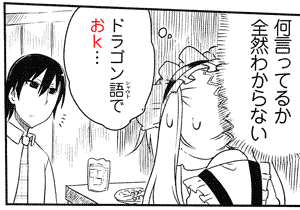In Japanese, おk means "ok" in Japanese, ok?
It's read oke おけ or ookee おーけー, ok?
It`s like up うp, ok?
Manga: Kobayashi-san Chi no Meidoragon 小林さんちのメイドラゴン (Chapter 4, トールと嫉妬)
Nihongo de ok
In Japanese, the phrase nihongo de ok 日本語でおk, meaning literally "with Japanese, [it] is okay," is a meme used when someone says something that sounds like a foreign language, i.e. like they're speaking Greek, talking using Greek, with Greek, rather than with Japanese.
See the de で particle for details.
Manga: Kobayashi-san Chi no Meidoragon 小林さんちのメイドラゴン (Chapter 4, トールと嫉妬)
- Context: a dragon maid doesn't understand a guy.
- nani itteru ka
zenzen wakaranai
何言ってるか全然わからない
[I] have no idea what [he] is saying. - doragon shauto de ookee...
ドラゴン語でおk・・・
With dragon shout [it] is OK. (literally.)
Can you say that again in dragon language?- Here, shauto シャウト is a gikun for go 語, "language."
"Okay" in Japanese
For reference, some other ways to say "ok" in Japanese:
- hai
はい
Yes, sir.
Okay, I'll do it.
- Used when answering affirmatively to someone. Translates to "no" sometimes.
- Synonyms include:
- ou
応
Yes. - un
うん
Yeah. - wakatta
わかった
Understood. - ryoukai shita
了解した - raja
ラジャ
Roger.
- ii yo
いいよ
It's good. It's fine.
It's okay, do it, you can do it.
It's okay, don't do it, I don't need you to do it.- If someone asks if they can do something, ii いい means "okay" as in they're allowed to.
- If someone asks you if you need something, ii いい means "okay" as in you're fine and don't need it.
- aketemo ii?
あけてもいい?
Is [it] okay if [I] open [it]? - ii いい = go ahead.
- akeyou ka?
開けようか?
Will [I] open [it]?
Should [I] open [it]? - ii いい = no, thanks.
- betsu ni ii
別にいい
It's okay one way or another.
I don't mind.
- daijoubu
大丈夫
I'm okay. I'm well. There's no problem.
Everything will be daijoubu.- heiki
平気
No worries.
- ma ni au
間に合う
To suit. To suffice.
- Used when something offered isn't necessarily because you aren't lacking it, e.g. when someone is selling you something:
- ma ni atte-imasu
間に合っています
It's okay, we don't need it, we already have one, etc.
- ha...
は・・・
I see...?
Okay...?

thanku
ReplyDelete